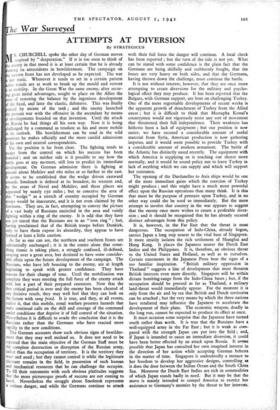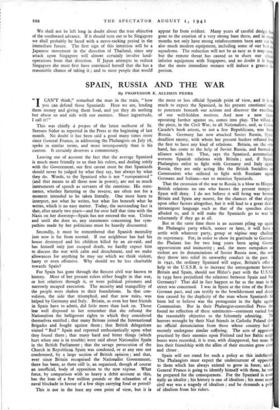he War Surveyed -
ATTEMPTS AT DIVERSION
By STRATEGICUS
R. CHURCHILL spoke the other day of German moves inspired by " desperation." If it is too soon to think of e enemy in that mood it is at least certain that he is already owing its antecedents in bewilderment. The campaign on e eastern front has not developed as he expected. The war not static. Whenever it tends to set in a certain pattern the minds are at work to break up the mould and restore to mobility. In the Great War the same enemy, after secur- g peat initial advantages, sought to place on the Allies the nus of restoring the balance by the ingenious development f the fixed, and later the elastic, defensive. This was finally ierced by means of the tank ; and the enemy launched e present war with the offensive in the ascendant by means f developments founded on that invention. Until the attack n Russia he had things all his own way. Now it is being hallenged by a command as resolute as his and more mobile its outlook. His bewilderment can be read in the wild romises he makes officially and the more candid admissions f his own and neutral correspondents.
Yet the position is far from clear. The fighting tends to scape from the control on which his success has been ounded ; and on neither side is it possible to say how the attle goes at any moment, still less to predict its immediate evelopment. On German admission there is fighting at resent about Mohilev and 16o miles or so farther to the east. t seems to be established that the wedge driven eastward °wards Smolensk is defined at its broadest, its western end, y the areas of Nevel and Mohilev, and these places are parated by nearly 15o miles ; but to conceive the area of s " wedge " as a stretch of country occupied by German oops would be inaccurate, and it is not even claimed by the ermans. They are, in fact, attempting to convey the picture f a vast body of Russians encircled in the area and vainly ghting within a ring of the enemy. It is odd that they have of yet stated that the Russians are in an " iron ring " ; but, having proclaimed that of the British troops before Dunkirk, only to have them expose its absurdity, they appear to have learned at least a little caution.
As far as one can see, the northern and southern fronts are substantially unchanged ; it is in the centre alone that some- thing titanic is taking place, a struggle confused, ill-defined, swaying over a great area, but destined to have some consider- able effect upon the future development of the campaign. The Russians, who have left boasting to the enemy, are at length beginning to speak with greater confidence. They have reasons for their change of tone. Until the mobilisation was complete they were meeting the full force of the enemy attack with but a part of their prepared resources. Now that the first critical period is over and the enemy has been cheated of any decisive result, they may well feel that they can look on the future with sang froid. It is true, and they, at all events, realise it, that this mobile, zonal warfare presents hazards that make continual calls on the skill and courage of the command under conditions that deprive it of full control of the situation. Nevertheless it is difficult to evade the conclusion that it is the Russians rather than the Germans who have reacted more rapidly to the new conditions.
The German accounts show such obvious signs of bewilder- ment that they may well mislead us. It does not need to be repeated that the main objective of the German Staff must be the complete destruction or disruption of the Russian army, rather than the occupation of territory. It is the territory they want and need ; but they cannot control it while the legitimate claimant remains in the field, in possession of such human and mechanical resources that he can challenge the occupier. To fill their statements with such obvious platitudes suggests that the more picturesque proofs of success are not coming to hand. Nevertheless the struggle about Smolensk represents a serious danger, and while the Germans continue to attack with their full force the danger will continue. A local check has been reported ; but the turn of the tide is not yet. What can be stated with some confidence is the plain fact that the Germans are being skilfully and stubbornly fought, that the losses are very heavy on both sides, and that the Germans, having thrown down the challenge, must continue the battle.
It is not without interest, however, that they are once more attempting to create diversions for the military and psycho- logical effect they may produce. It has been reported that the Bulgars, with German support, are bent on challenging Turkey. One of the more regrettable developments of recent weeks is the apparent growth of detachment of Turkey from the Allied cause ; but it is difficult to think that Mustapha Kemal's countrymen would not vigorously resist any sort of movement that threatened their full independence. Their weakness has hitherto been a lack of equipment ; but our position is now easier, we have secured a considerable amount of useful material from Syria, American production is now gathering impetus, and it would seem possible to provide Turkey with a considerable amount of modern armament. The battle of the Atlantic has distinctly eased recently. The equipment with which America is supplying us is reaching our shores more normally, and it would be sound policy not to leave Turkey in lack of anything which we can supply and which will support her resistance.
The opening of the Dardanelles to Axis ships would be one of the more immediate gains which the coercion of Turkey might produce ; and this might have a much more powerful effect upon the Russian operations than many think. It is this that must be the purpose of pressure upon Turkey, and in no other way could she be used so immediately. But the mere attempt to involve that country in the war appears to suggest that the enemy once more wishes to create a profitable diver- sion ; and it should be recognised that he has already secured distinct advantages from this policy.
It is, however, in the Far East that the threat is most dangerous. The occupation of Indo-China, already begun, carries Japan a long step nearer to the vital base of Singapore. It more straitly isolates the rich settlement of Shanghai and Hong Kong. It places the Japanese nearer the Dutch East Indies and the Philippines. It is, therefore, an obvious threat to the United States and Holland, as well as to ourselves. Certain statements in the Japanese Press bear the signs of a too familiar inspiration. " British military oppression in Thailand " suggests a line of development that must threaten British interests even more directly. Singapore will be within distant bombing-range from the Indo-China bases ; but, if the occupation should be pressed as far as Thailand, a military land-threat would immediately appear. For the moment it is only from the air and by sea that British and Dutch territories can be attacked ; but the very means by which the three nations have retaliated may influence the Japanese to accelerate the development of their plans. The economic weapon, deadly in the long run, cannot be expected to produce its effect at once.
It must occasion some surprise that the Japanese have turned south rather than Borth. It is true that the Russians have a well-equipped army in the Far East ; but it is weak as com- pared with the strength Japan can put into the field ; and, if japan is intended to cause an immediate diversion, it could have been better effected by an attack upon Russia. It struts possible that Japan has consulted her own imagined interest in the direction of her action while accepting German behests in the matter of time. Singapore is undoubtedly a menace to her freedom to develop her aggressive designs, controlling as it does the door between the Indian Ocean and the South China Sea. Moreover the Dutch East Indies are rich in commodities of which Japan stands badly in need. But it may be that the move is mainly intended to compel America to restrict her assistance to Germany's enemies by the threat to her interests. We shall not be left long in doubt about the true objective of the southward advance. If it should turn out to be Singapore we shall probably be faced with a nerve-racking period in the immediate future. The first sign of this intention will be a Japanese movement in the direction of Thailand, since any attack upon Singapore will almost certainly involve land- operations from that direction. If Japan attempts to reduce Singapore she must first have convinced herself that she has a reasonable chance of taking it ; and to most people that would appear far from evident. Many years of careful design 112 gone to the creation of a very strong base there, and in rec months not only have strong reinforcements been sent cut b also much modern equipment, including some of our best az squadrons. The reduction will not be as easy as it may seep but the remote threat has caused us to share our alrea inferior equipment with Singapore, and no doubt it is ho that the more immediate menace will induce a greater di. persion.



























 Previous page
Previous page